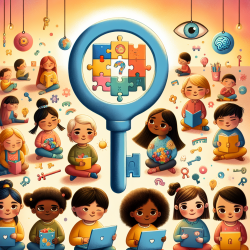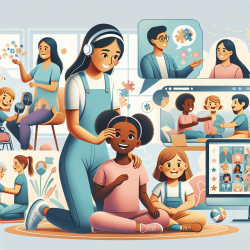In the field of speech-language pathology, data-driven decisions are crucial for creating impactful interventions. A recent study titled "Investigating the Improvement of Decoding Abilities and Working Memory in Children with Incremental or Entity Personal Conceptions of Intelligence: Two Case Reports" offers compelling evidence on how personal conceptions of intelligence can influence the effectiveness of multidimensional intervention programs. Here’s how practitioners can implement these findings to improve outcomes for children with developmental dyslexia.
The Study: Key Findings
The study focused on two 10-year-old children with developmental dyslexia, each holding different personal conceptions of intelligence—one incremental and one entity. Over a three-month period, both children participated in a multidimensional training program aimed at improving reading decoding abilities and verbal working memory.
- Incremental Mindset: The child with an incremental mindset (Alice) showed significant improvements in both reading accuracy and working memory. Her reading errors decreased by 30.56%, and her working memory IQ improved by 50% from pre-test to follow-up.
- Entity Mindset: The child with an entity mindset (Marta) also showed initial improvements in reading accuracy but did not sustain these gains over time. Her working memory improvements were minimal.
Implications for Practice
The study highlights the importance of integrating cognitive and motivational factors in intervention programs. Here are actionable steps practitioners can take:
1. Assess Mindset
Before beginning an intervention, assess the child’s personal conception of intelligence. Understanding whether a child holds an incremental or entity mindset can help tailor the intervention approach.
2. Foster an Incremental Mindset
Encourage children to adopt an incremental mindset by emphasizing effort and growth. This can be achieved through positive reinforcement and setting achievable, yet challenging goals.
3. Use Multidimensional Training
Incorporate both cognitive tasks (e.g., reading decoding) and motivational components (e.g., tasks that boost self-efficacy). The study's T.I.R.D. Multimedia Training for the Rehabilitation of Dyslexia is an excellent example of this approach.
4. Monitor and Adjust
Regularly monitor the child's progress and adjust the intervention as needed. The study showed that continuous improvement and long-term gains are possible, particularly for children with an incremental mindset.
Encouraging Further Research
This study is a stepping stone, but more research is needed to generalize these findings. Practitioners are encouraged to contribute to this growing body of knowledge by conducting their own studies and sharing their results.
To read the original research paper, please follow this link: Investigating the Improvement of Decoding Abilities and Working Memory in Children with Incremental or Entity Personal Conceptions of Intelligence: Two Case Reports.










